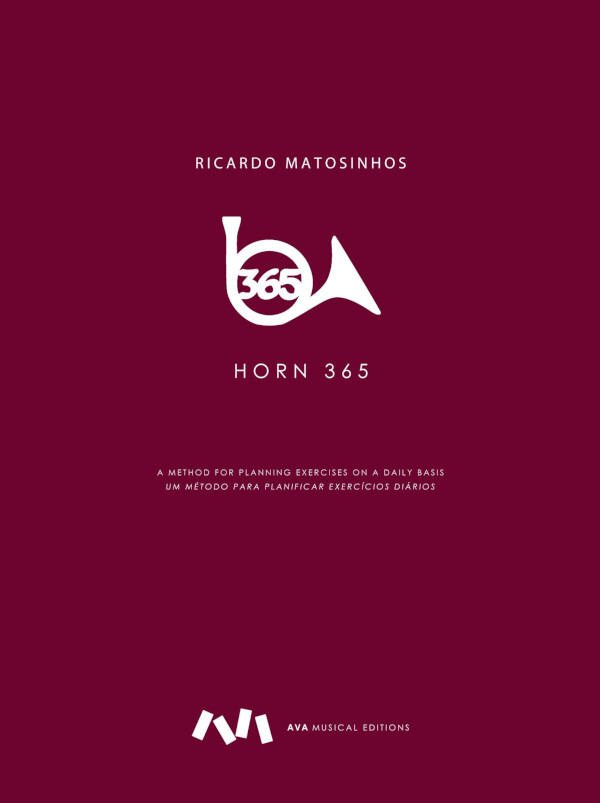 AvA Musical EditionsAusgabe: NotenArt-Nr.: S2153 / AVA212318
AvA Musical EditionsAusgabe: NotenArt-Nr.: S2153 / AVA212318
IA method for planning exercises on a daily basis
There are 365 exercises on this book, and at first you might think it means one exercise a day. Well, actually there are many, many more exercises on this book, since the way of doing them can give you ideas for several years of practicing.
There are plenty exercise books, however neither do they necessarily fit to the specific needs of every player nor to the learning sequence.
An exercise isnt easy or difficult by itself, since the player is the one, who feels the level of difficulty, its up to him to say whether something is easy or not. We are all unique, no two people are the same. For sure every single horn player needs to practice the same basic stuff, but the way of doing it, will depend largely on the evolution level and the individual situation of each person. So, planning seems to be the key, however if the player spends more time planning than executing the plan, then it will be of very little use.
This method is dedicated to Fr°ydis Ree Wekre, whom I consider one of the best living horn pedagogues. Her energy has inspired me to question and improve my teaching methods and to develop several pedagogical resources. Horn 365 has been gradually developed over the last 20 years and, in order to take in account a panoply of different situations, it presents each exercise with a number and the way of doing it is indicated by letters. The combination of different letters makes it possible to encode complex exercises on codes, that are short and easy to understand, which leaves more time to practice, with the minimum amount of planning. By using this method, teachers can easily adapt the exercises to their students, and students can gain autonomy to gradually choose their own path and adjust their practice to their level and current situation.
Another important aspect to take in consideration is the fact that we come so often across students that arent able to organize their practice sessions. It is very usual to see a student learning a specific technique (stopped notes, lip trills, double staccatoetc.) by practicing it ad nauseum during several days, just to never practice it again. All horn techniques require continuous practice in order to be mastered, so a good planning is essential to achieve the goals. Basic techniques are required to be included in the practice sessions on a daily basis and despite requiring seldom practice, secondary techniques should not be forgotten either.
After understanding and applying this concept to the exercises, this method can be applied to solo, chamber or orchestral repertoire. One thing is sure, in order to tame or at least try to tame this wild beast from the forest, we need to practice regularly. However, this process doesnt need to be boring. With variety, every day can be special and the horn can be practiced and enjoyed every single day.
Practicing a different pattern a day makes at least 365 patterns a year, which means creating a music vocabulary ready to be used when needed. Horn playing is and will always be difficult. But this way it can become a little bit easier, and for sure more fun. As I always say, have fun practicing the horn 365 days a year!
Ricardo Matosinhos was born in 1982.
He studied horn with professor Ivan Ku
era at the Esproarte (1994-2000), Mirandela, Portugal and with professor Bohdan Sebestik at the Superior School of Music and Performing Arts (2000-2004) in Oporto, Portugal.
Ricardo was graduated from ESMAE in 2004, where he received the prize of student of the school year 2003/2000.
In 2012 Ricardo presented his master dissertation entitled Annotated Bibliography of Horn Etudes published Between 1950-2011 at Universidade Católica Portuguesa.
Curiosity about he possibilities of the horn in jazz led him to take lessons with the saxophonist Mário Santos. This experience would play a major role in his style of composition.
In 1998 he won a scholarship by Calouste Gulbenkian Foundation, that he kept until his graduation.
Ricardo taught several masterclasses and workshops all over Portugal and also in the Czech Republic.
He played as guest with orchestras such as: Filarmonia das Beiras Orchestra, Musicare Chamber Orchestra, Orquestra do Norte, Remix Orchestra, Remix Ensemble and Orquestra Nacional do Porto.
Ricardo wrote several teaching materials for horn but also some music works for other instruments.
His music works were recognized in several composition contests both in Portugal and abroad.
Ricardo is currently teaching at the Academia de Música de Costa Cabral and at the Superior School of Music and Performing Arts (ESMAE) in Oporto Portugal.
He is a member of the International Horn Society.





